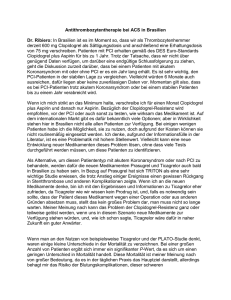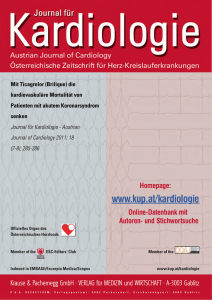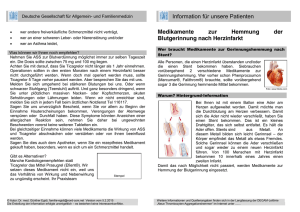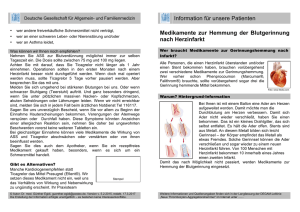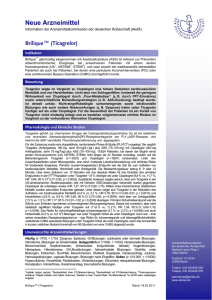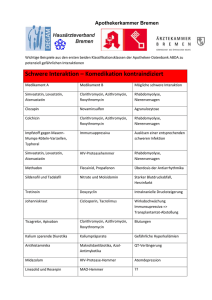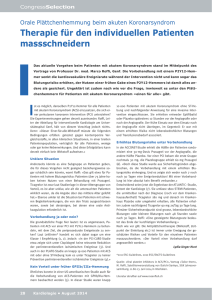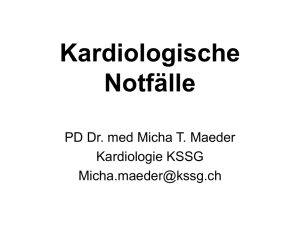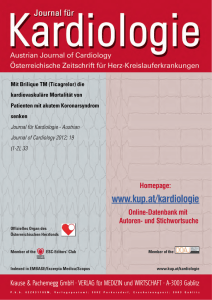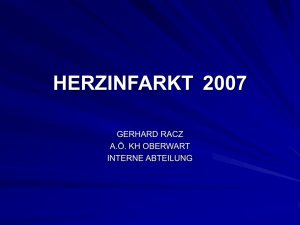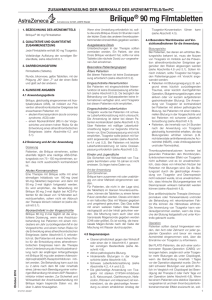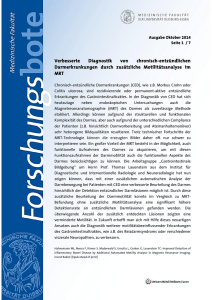Prof. Dr. Martin Möckel
Werbung
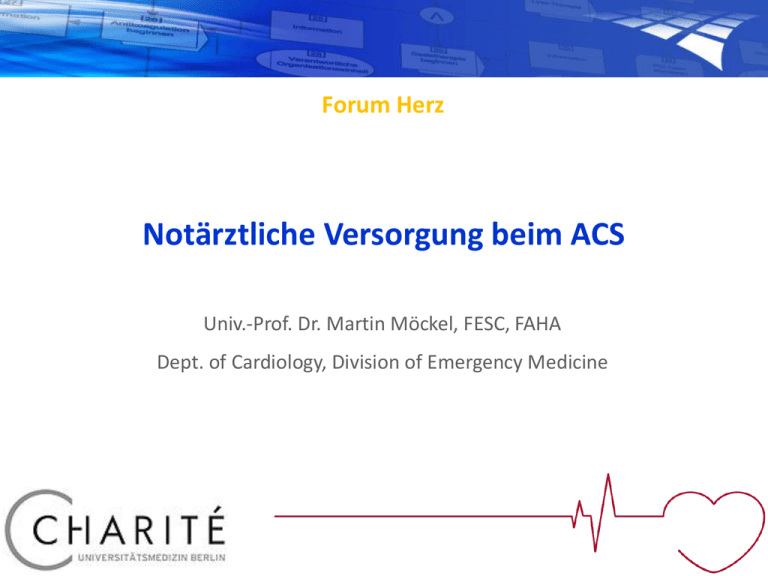
Forum Herz Notärztliche Versorgung beim ACS Univ.-Prof. Dr. Martin Möckel, FESC, FAHA Dept. of Cardiology, Division of Emergency Medicine Agenda • • • • • • Fallvignette I Präklinische Therapie beim STEMI (Diagnostische) Qualität der Notarztversorgung Fallvignette II (Prä)klinische Therapie beim NSTEMI Zusammenfassung und Schlussfolgerungen 54 Jahre, männlich Rettungsdienst - Notarztwagen Notarztwagen - Herzkatheter Klinik - Rehabilitation Empfehlungen beim STEMI ATLANTIC Eine Studie zum „Preloading“ beim STEMI • Ticagrelor reduziert kardiovaskuläre Todesfälle, Herzinfarkte und Schlaganfälle im Vergleich zu Clopidogrel beim ACS in der PLATOStudie[Wallentin 2009]; die Subgruppe der STEMI-Patienten profitiert ebenfalls[Steg 2010] • Bislang gab es keine Studien, die explizit die prähospitale Gabe von Ticagrelor randomisiert untersucht haben[Montalescot 2013] • Primäres Studienziel war daher die Bestimmung des optimalen Timings der Medikation mit Ticagrelor bei Patienten mit STEMI vor PCI • Zusätzliche Substudie zur Thrombozytenhemmung • Montalescot G et al. Am Heart J 2013;165:515–522; Steg PG et al. Circulation 2010;122:2131–2141; Wallentin L et al. N Engl J Med 2009;361:1045–1057 Studiendesign, ATLANTIC: STEMI auf dem Weg zur Akut-PCI N=1770 (n=1862*) Schriftliche Einwilligung im NAW Symptome des AMI mehr als 30 min aber kürzer als 6 h Neue, anhaltende ST-Streckenhebungen ≥1 mm in zwei oder mehr gleichsinnigen EKG-Ableitungen Randomisiert, doppel-blind Ticagrelor 180 mg loading dose Pre-hospital Placebo loading dose Placebo loading dose In-hospital Ticagrelor 180 mg loading dose Primary objective ≥70% ST-segment elevation resolution pre-PCI OR TIMI flow grade 3 of MI culprit vessel at initial angiography Ticagrelor 90 mg/bid 30 days *Consented and randomized Montalescot G et al. Am Heart J 2013;165:515–522 Montalescot G et al. N Engl J Med September 1, 2014 [Epub ahead of print; DOI: 10.1056/NEJMoa1407024] • Primäres Ziel der ATLANTIC-Studie: “To assess the efficacy of pre-hospital administration of ticagrelor compared to an in-hospital administration by comparing percentage of patients not achieving the co-primary endpoints” ≥70% ST-segment elevation resolution pre-PCI, between pre-hospital assessment and in-hospital assessment TIMI flow grade 3 of MI culprit vessel at initial angiography Montalescot G et al. Am Heart J 2013;165:515–522; Montalescot G et al. N Engl J Med September 1, 2014 [Epub ahead of print;] Keine ST-Streckenhebung ≥70% und kein TIMI 3 Fluss im Infarktgefäß •Pre-PCI† – Pre-hospital n=744 – In-hospital n=777 •Post-PCI‡ – Pre-hospital n=763 – In-hospital n=775 P=NS Pre-hospital In-hospital P=NS Pre-PCI Montalescot G et al. N Engl J Med September 1, 2014 [Epub ahead of print; DOI: 10.1056/NEJMoa1407024] Post-PCI Montalescot G et al. N Engl J Med September 1, 2014 [Epub ahead of print; DOI: 10.1056/NEJMoa1407024] Definitive akute Stent Thrombose innerhalb von 30 Tagen Ticagrelor pre-hospital Ticagrelor in-hospital Event rate (KM %) 2 1 Ticagrelor pre-hospital 2/906 (0.2%) vs ticagrelor in-hospital 11/952 (1.2%) OR 0.19 (95% CI 0.04, 0.86), P=0.02 0 0 2 24 h P=0.008 4 6 8 10 12 14 16 18 20 22 24 26 28 30 Time (days) 30 days P=0.02 Montalescot G et al. N Engl J Med September 1, 2014 [Epub ahead of print; DOI: 10.1056/NEJMoa1407024] Prozeduren Wie gut ist die Diagnose des Notarztes? Patient characteristics in pre-hospital medical care Johann Frick, Anna Slagman, Julia Searle, Clara Thomas, Judith Mahlig, Tobias Lindner, Martin Möckel Division of Emergency Medicine and Chest Pain Units (CVK, CCM), Charité - Universitätsmedizin Berlin Johann Frick, Anna Slagman, Julia Searle, Clara Thomas, Judith Mahlig, Tobias Lindner, Martin Möckel Division of Emergency Medicine and Chest Pain Units(CVK, CCM), Charité - Universitätsmedizin Berlin Results - Comparison of main hospital diagnoses with suspected diagnoses of patients who presented to the ED via physician-staffed ambulances Figure 1: Comparison of main hospital diagnosis with suspected diagnosis n=170 concordant similar discordant Reasons for discordance • Suspected diagnosis was a symptom of the main diagnosis n=6 (3.5%) • Misinterpretation of a symptom n=19 (11.2%) • Different terms for the same diagnosis n=14 (8.2%) • Wrong prehospital diagnosis n=10 (5.9%) – none with ACS 44 Jahre, männlich • Seit mehreren Tagen rezidivierende AP • Typ 1 Diabetes mellitus • Chronische Niereninsuffizienz bei V.a. diabetische Nephropathie • Aktuell Vorstellung in der Notaufnahme wegen Mischintoxikation in fraglich suizidaler Absicht mit Ibuprofen, Pipamperon (sedierendes Neuroleptikum), Viagra, Alkohol • Vitalzeichen normal, Patient somnolent Erstes EKG Labor * Verlauf (1) • Intensivüberwachung • Patient kardiopulmonal stabil, keine AP mehr; Kreatinin 132µmol/L (1,5mg/dL) • Kontaktaufnahme Charité: ASS, Heparin, Loading Ticagrelor 180mg; Verlegung zur invasiven Diagnostik sobald wie möglich • Weitere Medikation: Insulinperfusor • Verlegung am Folgetag geplant Herzkatheter • Normale Pumpfunktion • Schwere diffuse 3-Gefäß-KHK Verlauf (2) • Herzteam: Entscheidung zur dringlichen OP am Folgetag; Ticagrelor pausiert • Intensivüberwachung, psychiatrisches Konsil: • Erfolgreiche OP; aus dem Bericht: Bei guter Bluttrockenheit Sternumverschluß mit Drahtcerclagen. • Unkomplizierter weiterer Verlauf; Rückverlegung zuweisendes Krankenhaus, stationäre ReHa Empfehlungen beim NSTE-ACS Keine konkrete Empfehlung zum Timing auf dem Notarztwagen Kumulative Ereignisraten (CV Tod und spontaner AMI) nach vordefinierten Grenzen von hs-TnT bei Patineten mit NSTE-ACS Clopidogrel vs. Ticagrelor Clopidogrel vs. Ticagrelor PLATO-Substudie: Wallentin L et al. Circulation. 2014;129:293-303 Copyright © American Heart Association, Inc. All rights reserved. PLATO-Substudie, Varenhorst et al. JACC 2012, 60:1623-30 Tod durch Blutung Tod durch Infektion • Das Notarztwesen in Deutschland ist gut etabliert und von hoher fachlicher und organisatorischer Qualität • Die Erstversorgung des STEMI ist eine Domäne des Notarztes mit einem Focus auf dem schnellen und sicheren Transport • Die präklinische Pharmakotherapie enthält heute häufig auch bereits einen zweiten Plättchenhemmer (Ticagrelor, Prasugrel) • Für das Outcome des Patienten ist der intersektorale Behandlungspfad besonders bedeutsam 1910 http://notfallmedizin.charite.de
